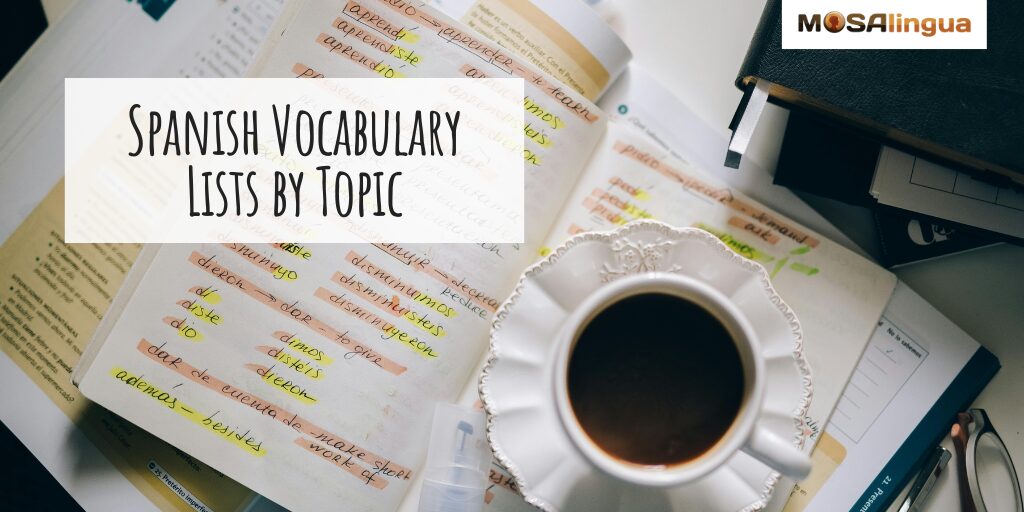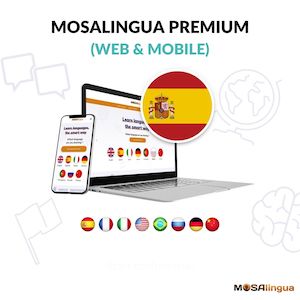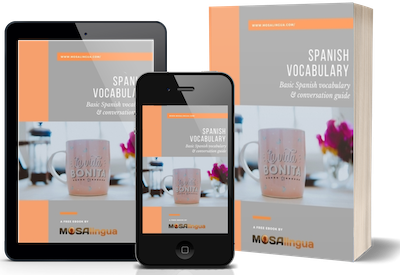Today, we’re talking about la vida, la familia, el trabajo, la cocina… that’s right, Spanish vocabulary! Learning essential vocab is a key step if you want to learn to speak Spanish fast. So, whether you’re on vacation, in a business meeting, or even having an emergency in a Spanish-speaking city, you’ll be covered if you’ve memorized the core words and phrases below. These Spanish vocabulary lists organized by topic feature common Spanish words and expressions you’ll encounter daily. At the end of the article, you can use our free Spanish language quiz to test yourself!
Last Updated: 16/04/2023

Need a Spanish vocabulary cheat sheet?
Grab your free PDF of our Spanish Vocabulary eBook today.
Learn Spanish vocabulary
13 Spanish Vocabulary Lists, By Topic & Level
To help you find the most appropriate vocabulary for your needs, we’ve organized some essential Spanish vocabulary by topic.
These lists include the 100 most common Spanish words and phrases, so you should learn them all sooner or later. However, if you want to learn something specific, use the search feature (⌘+F on Mac or Ctrl+F on Windows) and enter either an English or Spanish word.
Basic Spanish Vocabulary
Greetings
FYI, this list contains the most basic Spanish vocabulary. Your top priorities are this first list, plus the ones on manners and conversations. They contain 50 basic Spanish words and phrases, the most common and useful vocabulary that you can start communicating with right away. They’re the bare minimum, the most important Spanish words to know if you’re traveling to a Spanish-speaking country or want to talk to a Spanish language partner.
- Hello — Buenos días
- Good evening — Buenas tardes
- Good night — Buenas noches
Here, the terms días, tardes and noches are in plural form. In certain Latin American countries and even some places in Spain, it’s common to use the more familiar term and simply say, “Buenas.”
- Hi — Hola
- How’s it going? — ¿Cómo está? (formal) or ¿Qué tal?, ¿Cómo estás? (informal)
- Very well, thank you — Muy bien, gracias
- What’s your name? — ¿Cómo te llamas?
- My name is … — Me llamo …
- Goodbye — Adiós or Chau (informal)
- See you soon — Hasta pronto
- See you later — Hasta luego
- Yes — Sí
- No — No
- I don’t know — No sé
We have a whole article dedicated to Spanish greetings and goodbyes, so check it out if you want to spice up your vocabulary!
Manners
Even if you don’t know much Spanish, people are much more likely to be nice to you and help you out if you are polite to them!
- Please — Por favor
- Thank you — Gracias
- You’re welcome / no problem — De nada
- Pleased to meet you — Mucho gusto
- Excuse me, pardon me — Disculpe, Perdón
- Don’t worry about it / it doesn’t matter / no worries — No importa, No te preocupes
- Good luck — Buena suerte
- Excuse me please (used to pass someone) — Permiso, Con permiso (para pasar)
- Please sit down — Siéntese, por favor (formal), Siéntate, por favor (informal)
- I agree — Estoy de acuerdo
- It’s good — Está bien, está bueno
- I am very sorry! / I’m so sorry! — ¡Lo siento mucho!
Your first conversation
If we were to give you all the vocabulary you might need for a conversation, we might as well give you a dictionary! So, once again, we’ve only selected the most important Spanish words and phrases, the vocab you’ll need for most basic conversations when you’re just starting to learn the language. This Spanish vocabulary list will also help you avoid misunderstandings, comprehend what’s being said to you, and make sure others understand you.
- I am English / American — Soy inglés(a) / americano(a)
- I don’t understand — No entiendo
- Do you understand me? — ¿Me entiende? (usted, formal address)
- Is there someone who speaks English here? — ¿Hay alguien que hable inglés?
- How do you say … in Spanish? — ¿Cómo se dice … en español?
- What do you call this? — ¿Cómo se llama esto?
- What does … mean? — ¿Qué significa … ?
- Could you speak slower, please? — Más despacio, por favor
- I don’t speak Spanish (very well) — No hablo (muy bien) español
- I speak (a bit of) Spanish — Hablo un poco de español
- You misunderstood me — No me has entendido bien
- Could you repeat that please? — ¿Puedes repetirlo, por favor?
- I’m learning Spanish at the moment — Estoy aprendiendo español
You might want to practice these with a Spanish-speaking conversation partner before you try them out “live.” Find out where and how to meet conversation partners to practice your Spanish with.
Start improving your Spanish today

Good news: we can help!
More good news: you can get started for free! With your free trial, you can test drive the most effective method for learning Spanish for the next 15 days!
Vocabulary flashcards, videos with subtitles, audiobooks, articles adapted to your level – with MosaLingua Premium (Web & Mobile), you’ll have access to all this and more. Get started right now. It’s free—and risk-free—to try!
Family
These Spanish words about family will be particularly useful if you’re a beginner. Family is very important in Hispanic and Latino culture, so it’s good to know how to talk about family in Spanish.
- family — la familia
- parents — los padres
- mother — la madre
- father — el padre
- child — el niño or la niña
- grandfather — el abuelo
- grandmother — la abuela
- daughter — la hija
- son — el hijo
- uncle — el tío
- aunt — la tía
- stepmother / stepfather — la madrastra / el padrastro
- mother-in-law / father-in-law — la suegra (madre del esposo o de la esposa) / el suegro (padre del esposo o de la esposa)
- brother — el hermano
- sister — la hermana
- cousin — la prima / el primo
Basic Spanish vocabulary: Food and drinks
This is just the tip of the iceberg lettuce… (sorry for the cringy attempt at a Spanish joke). To learn the names of fruits, vegetables, condiments, and lots more, download the MosaLingua Learn Spanish app.
- food — la comida
- drinks — las bebidas
- vegetables — las verduras
- to cook — cocinar
- I’m hungry — Tengo hambre
- I’m thirsty — Tengo sed
- breakfast — el desayuno
- lunch — el almuerzo
- dinner — la cena
- What’s today’s special? — ¿Cuál es el plato del día?
- What would you like to eat? — ¿Qué le gustaría comer?
- Could I have the bill, please? — ¿Me puede traer la cuenta, por favor?
- It’s very good — Está muy sabroso(a)
- Enjoy (your meal)! — ¡Buen provecho!
- Cheers! — ¡Salud!
- sweet — dulce
- savory — salado(a)
Intermediate Spanish Vocabulary
Clothing
- clothing — la prenda, la ropa
- shoes — los zapatos
- pants / trousers — el pantalón
- shirt / t-shirt — la camisa / la camiseta
- jacket — la chaqueta
- skirt — la falda
- sweater / jumper — el suéter
- dress — el vestido
Do any of those Spanish words seem hard to pronounce? Download our free Guide to Spanish Pronunciation and learn everything you need to know about having a great Spanish accent!
Intermediate Spanish vocabulary: Dates and times
Days of the week in Spanish
- Monday — lunes
- Tuesday — martes
- Wednesday — miércoles
- Thursday — jueves
- Friday — viernes
- Saturday — sábado
- Sunday — domingo
Months in Spanish
- January — enero
- February — febrero
- March — marzo
- April — abril
- May — mayo
- June — junio
- July — julio
- August — agosto
- September — septiembre
- October — octubre
- November — noviembre
- December — diciembre
Other time words in Spanish
- What time is it? — ¿Qué hora es?
- hour — la hora
- day — día
- a week — una semana
- a month — un mes
- a year — un año
- morning — la mañana
- afternoon — la tarde
- evening / night — la noche
- noon / midday — mediodía
- midnight — medianoche
Travel
- journey — viaje
- baggage — el equipaje
- departure / arrival — la salida/ la llegada
- ID papers / ID documents — los documentos de identidad
- plane tickets — los billetes de avión
- boarding pass / card — la tarjeta de embarque
- Where are you going? — ¿A dónde va?
- I’d like to reserve a room for two people — Me gustaría reservar una habitación para dos personas
- a budget / low-cost hotel — un hotel económico
- car — coche / carro
- driver’s license — el permiso de conducir
- to get gas / petrol — echar/poner gasolina
- Could you show me on the map? — ¿Me lo puede mostrar en el mapa?
- I’d like to go to… — Quiero ir a…
- I’m lost, could you help me please? — Estoy perdido(a), ¿me puede ayudar, por favor?
- Where are we? — ¿Dónde estamos?
For more Spanish travel vocabulary, I highly recommend downloading our free Spanish travel phrasebook. It lists basic Spanish vocabulary for travel including means of transportation (plane, car, bus, train, etc.), activities, and needs (reserving a room, taking a plane, etc). And just for fun, find out some cool things to do in Barcelona to motivate yourself to learn these Spanish words about travel!
In case of emergency…
This list is essential if you’re going to Spain or Latin America, whether it’s for a weekend trip or for a longer stay. I really hope you won’t need it, but keep this list of emergency Spanish vocabulary handy just in case!
- Help! / Help me! — ¡Socorro! ¡Ayúdeme!
- I need your help — Necesito su ayuda
- It’s an emergency — Es una emergencia
- I’ve lost my passport — He perdido el pasaporte
- Leave me alone — ¡Déjame en paz!
- There’s a fire! — ¡Hay un incendio!
- I need a doctor urgently — Necesito un médico urgentemente
- I am ill /sick — Estoy enfermo(a)
- medicine — el medicamento
- Where is the nearest pharmacy? — ¿Dónde está la farmacia más cercana?
- I’m going to the hospital — Voy al hospital
- headache — el dolor de cabeza
Advanced Spanish Vocabulary
Work
- cover letter — carta de presentación
- CV / resume — el CV or currículum
- business / firm / company — la firma, el negocio, la compañía
- boss — el jefe
- employee — el empleado
- to work — trabajar
- to go to work — ir al trabajo
- working hours — el horario de trabajo
- strategy — la estrategia
- freelancer / independent — el autónomo / trabajador por cuenta propia
If you’d like to learn more specific vocabulary about the world of business or learn professional Spanish, we also have a special Spanish for Business app. Click to learn more or to download it!
Moods and emotions
Here is a list of Spanish words to know so that you can tell people how you are feeling.
- happy / content — contento(a), feliz, alegre
- depressed — deprimido(a)
- worried — preocupado(a)
- excited — emocionado(a), excitado(a)
- calm / relaxed — tranquilo(a), calmado(a)
- anxious / nervous — nervioso(a)
Can’t find the exact word you need to express how you’re feeling? Check out this article all about Spanish emotions.
Useful adjectives
Make your conversations more specific with these common Spanish adjectives. For other useful descriptive words, read our article and video about colors in Spanish.
- new — nuevo(a)
- fast — rápido(a)
- closed — cerrado(a)
- open — abierto(a)
- hot — caliente
- cold — frío
- small — pequeño(a)
- clean — limpio(a)
- easy — fácil
- funny — divertido(a), gracioso(a)
- nice / kind — simpático, agradable
- red — rojo(a)
- blue — azul
- yellow — amarillo(a)
Useful verbs
This list is by no means exhaustive! But it does include some of the most important and useful verbs in Spanish.
- to be — estar, ser
- to have — haber (verbo auxiliar), tener
Those two verbs are what we call “auxiliary verbs,” otherwise known as “helper verbs.” You’ll use them a ton, especially once you start learning tenses.
- to communicate — comunicar
Learn this list of verbs if you want to be able to communicate in Spanish!
- to live — vivir
- to improve — mejorar
That’s an important one for learners 😉
- to reach — alcanzar
- to refuse / reject — rechazar
Don’t get that one mixed up with “to reach” (alcanzar) even though they look similar!
- to pay — pagar
- to extend / spread — expandir(se)
That little (se) on the end means that the verb can be reflexive.
- to deny /refuse — negar
- to sneeze — estornudar
Spanish, like English, has some irregular verbs. Learn what they are and how to conjugate irregular verbs in Spanish in your MosaLingua app!
Why Should I Learn Spanish Vocabulary Lists by Topic?
Organizing words by theme helps you group related words together to learn more words quickly and lets you pick and choose exactly what you learn.
For example, don’t bother learning professional vocab if you never plan to use Spanish for your work. You probably already know that at MosaLingua, we’re big believers in the Pareto Principle. We think you should learn the 20% of a language that is used in 80% of situations. So, you’ll only find the most common and useful Spanish words and phrases in these lists.
Browse through our lists of core Spanish vocabulary in the main menu above to find the topic you need, and with the click of a button, you’ll have all the Spanish words, phrases, sentences, and expressions you should know right at your fingertips. Then, all that’s left is to memorize them! Whether you’re a beginner, an intermediate learner, or have reached an advanced level, flashcards are a great tool for learning new words.
How Can I Learn Spanish Words More Easily?
There’s no secret to learning this Spanish vocabulary, you just have to memorize it. It’s the only way to learn these words and expressions and commit them to your long-term memory.
That said, learning by heart does not necessarily mean boring work! You can totally make learning this basic Spanish vocabulary more fun, simply by associating it with activities you enjoy.
To begin, find a learning method that both targets your needs and appeals to you. We recommend giving our app for learning Spanish a try.
The advantage of our app is that you don’t have to spend hours studying to make rapid progress. Actually, just 5 to 10 minutes a day is enough to get a good start!
Our app sends you notifications when you need to review the vocabulary you have previously learned, so it’s easy to practice consistently.
Keep studying until you’ve committed the Spanish words you need to your long-term memory and always have it on the tip of your tongue.
Having a great Spanish dictionary also helps – we recommend using the online dictionary offered by the Real Academia Española.
Is It Possible to Make Learning Spanish Words Fun?
As I said, studying vocab doesn’t have to be tedious. Integrate vocabulary practice into fun activities to help you learn it. Like what, you might ask?
- You can start by jotting down the Spanish vocabulary you learned today on Post-it notes. Then, stick them on all the objects at home or in your office that you want to know! The idea is to put them in visible spots so that you see them as often as possible. Don’t take them down until you can remember the words without giving it any thought!
- Another one of my favorite activities is to watch films, in Spanish of course. Pick out some Spanish movies on Netflix and enrich your vocabulary while also improving your listening comprehension skills – and having fun!
- Similarly, you can watch TV series in Spanish or listen to the radio, and get your ear used to the sounds of Spanish.
We grouped all of these fun activities and more into a guide to the best resources for learning and practicing Spanish. Check them out for more ideas and inspiration!
Spanish Vocabulary Quiz
Think you’ve mastered these common Spanish words and phrases? Take our Spanish test for beginners to find out!
If you liked this article, go further:
- 5 Simple Ways to Memorize Vocabulary
- 10 Good Reasons to Learn Spanish
- 10 Everyday Spanish Phrases for Beginners
- From Head to Toe: All the Body Parts in Spanish to Know


















Thanks for the test. It was good to see how much I understand. I don’t get to speak as much as I would like. I would progress a lot faster if I had the opportunity to do so. I really did enjoy the articles as well. You have a nice web page.
Good
I found what I was looking for
I’m so glad it was helpful, Desire! If you haven’t already, be sure to download the free eBook we put together so that you’ll have everything you need at your fingertips.
Abbe
Nice
completed